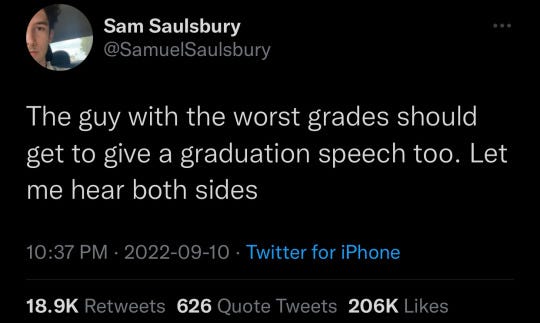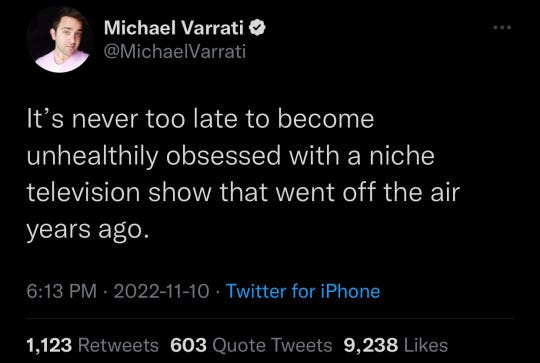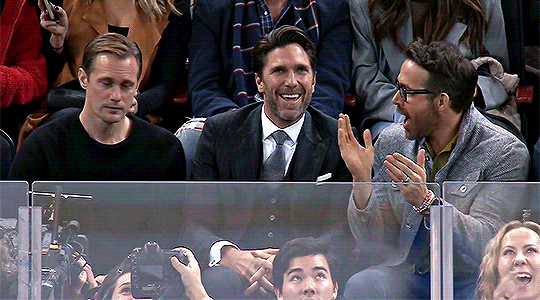this post contains a flashing gif at the end
Last Friday as I was writing my newsletter I was full of enthusiasm and energy. Less than twenty-four hours later I was taking a COVID test and had to face facts: the miserable runny nose I’d begun having on Saturday afternoon was not, in fact, some kind of environmental allergy, but a COVID rebound case that has kept my sister and I in our apartment since then.
It’s sucked, I’m not going to lie! After giving up my holiday vacation to the dreaded round boi it felt like an extra insult to lose a week of the new year. And lose it I did. I felt worse, if anything, than round 1. Lethargic, clammy, with a runny nose and a cough and sneezing so violently that it was actually painful. I cannot recommend this variant (or any variant) to anyone.
All of which is to say that I haven’t had much energy for anything beyond watching TV and sleeping. All that TV time, however, has given me a wonderful new show to obsess about: the German Netflix time-travel show Dark.
Dark centers around the small German town of Winden, a sleepy, insular, bucolic place home to a bunch of fresh-faced youths and a nuclear power plant. Children begin to go missing from this seemingly idyllic place, exposing the secrets their families have been trying very hard to keep. At its core, though, Dark is a show about how strong a hold the past has on the present, and the futility of changing the past, however much you might want to.
It’s this kind of impossible desire that is my favorite brand of time travel story. There are obviously others, where attempts to change the past are successful, even if inadvertent—think of the famous Ray Bradbury short story “A Sound of Thunder,” in which a rich businessman who has paid to go back in time to hunt dinosaurs accidentally crushes a flower, thus changing the flow of history. But I’m more drawn to the closed-loop idea: things can’t be changed, because they happened. They happened, therefore they can’t be changed. Dark is a supreme example of this and is a masterwork of storytelling. (I’m most of the way through season 2, so hopefully that doesn’t change. From here on out there will be spoilers for both Dark and several of the Oxford Time Travel novels, so if you want to miss those, skip to the paragraph beginning “this show has an absolute chokehold on me.”)
At Dark’s center is teenager Jonas Kahnwald, whose father Michael Kahnwald commits suicide in the first episode. Over the course of the show, Jonas launches himself back and forth through time, trying desperately to change the horrifying future he’s caught a glimpse of. In one heartbreaking moment in season 2, he travels back to the day before his father kills himself, in a desperate effort to convince him not to. He’s convinced that his father’s death is the catalyst for all the awful shit that comes after—and if he can stop it, then he can prevent the apocalypse. But unbeknownst to Jonas, his father has just caught sight of his younger self and has been deeply shaken. Michael, we have learned, is a grown-up Mikkel, who in 2019 is the young son of close friends, and Michael sees his younger self through a window, knowing that in mere months he’s going to be sent back in time, and will grow up as someone else’s son. Faced with Jonas’ pleas, Michael sees a different vision of the future: if Michael lives, Mikkel won’t disappear, and then Jonas won’t exist. His son won’t grow up, and that’s something Michael can’t bear.
There are parallels here to Connie Willis’ duology Blackout/All Clear (spoilers, obviously.) Towards the end of All Clear, one character makes the decision to stay behind in the past, in order to make sure that another historian in the future knows where to find the others. In her acceptance speech as Guest of Honor at the Hugos one year, Connie Willis quoted Thornton Wilder: “There is a land of the living and a land of the dead, and the bridge is love, the only survival, the only meaning.” Dark is only too aware of this—love is a bridge and a tether, and the things we do for those we love can hurt as well as help.
But the characters keep trying, anyway. Despite the odds, despite vast time travel conspiracies and an apocalypse and the everyday petty jealousies and secrets that people have with one another, they try anyway, to alter the future’s course. To change the past and prevent the future.
One of my favorite moments in To Say Nothing of the Dog is when the characters realize that, contrary to received knowledge, things can be brought through the time-travel net—only if they have been destroyed in the time they’re moving to. So all the lost treasures of the earth—the library of Alexandria, Coventry Cathedral, cats—all the things that had been lost to calamity and destruction can be revived and made new.
This show has an absolute chokehold on me at the moment, and my only regret is that because of my ailment I don’t have the energy or strength of mind to just binge it straight through and find out what the heck happens in the end. Hopefully I’ll have gotten there by next week and will have something more coherent to say about it. In the meantime. I wanted to talk about what draws me to this kind of story. Thanks for reading this far.
WHAT I’M READING
I finished reading Ocean’s Echo, and I don’t know that my opinion of it has changed much from last week. It’s breezy, fast-paced, and not as strong as Winter’s Orbit. The last quarter, in particular, descends into the kind of expository dialogue that drives me bonkers, where one character asks another “How much do you know about X?” and then after that character responds, says something like “Go on.” Tell me you’re infodumping without telling me you’re infodumping, etc. Still, as I said to a friend when we were discussing it last week, it’s not that deep—it’s a space romp about sexy mind melds, and I liked the way Maxwell navigated the consent issues around Surit and Tennel’s relationship.
Next up I have some options: I have a truckload of books purchased over the holidays (Thank you, Barnes & Noble 50% hardcover sale, and also thank you to Brazos Bookstore for being terrible enablers). I think I’ll tackle John Fowles’ The Magus. I’m making a little reading list and we’ll see how much I can get through:
Daughter of the Moon Goddess by Sue Lynn Tan
Breasts and Eggs by Mieko Kawakami trans. by Sam Bett
The Whalebone Theatre by Joanna Quinn
Nine Liars by Maureen Johnson
What are y’all reading? So far my StoryGraph stats are dismal—one book finished in 2023—but in my defense, I had Covid! I’m not beating myself up about it.
THIS WEEK IN HOCKEY
Man, IDK. Nicklas Backstrom is back in the lineup after hip surgery in the off-season, and scored his first points back in the Capitals’ disappointing loss to the Flyers. But hey, Alexander Skarsgard and Ryan Reynolds went to a game with Henrik Lundqvist and they all gave each other little smooches, so that’s nice.
READING: The Magus by John Fowles
WATCHING: Dark
LISTENING: Lonely by RM of BTS
This has been A Faster No, a dispatch on publishing, writing, books, and beyond. Is there something you’d like me to talk about? Leave it in the comments or reply to the email! You can support the newsletter here. If you purchase a book from any of the links to Bookshop.org I get a small commission at no cost to you. I am available for developmental editing and editorial assessment services via Reedsy.





Currently reading Katelyn Monroe Howes's THE AWOKEN. Haven't finished a book in 2023 yet. I'm extraordinarily slow this year, apparently ;-)